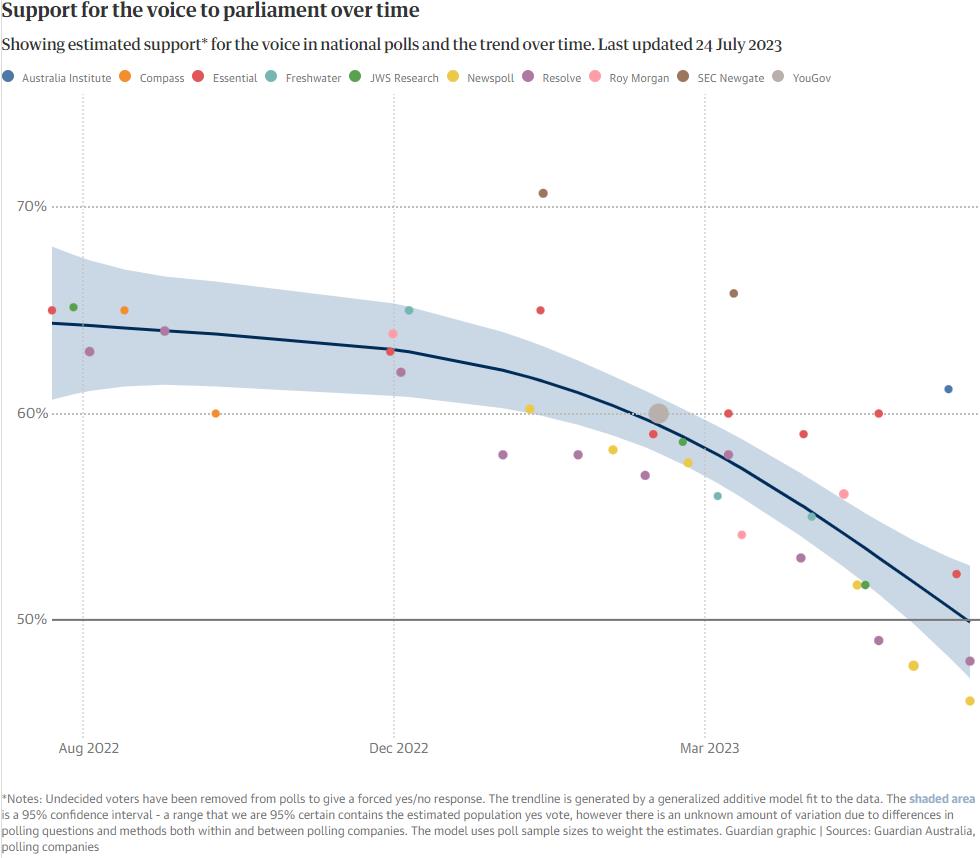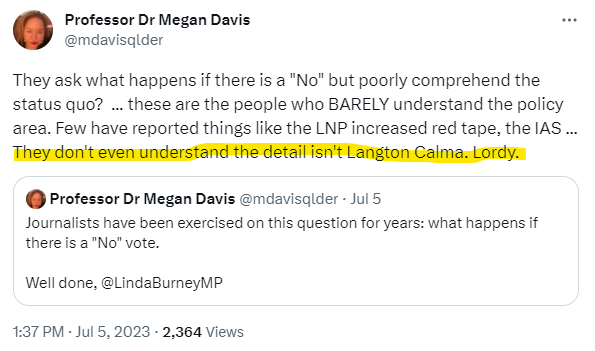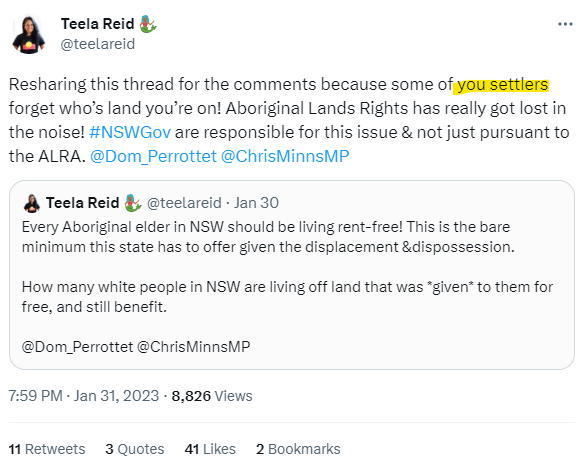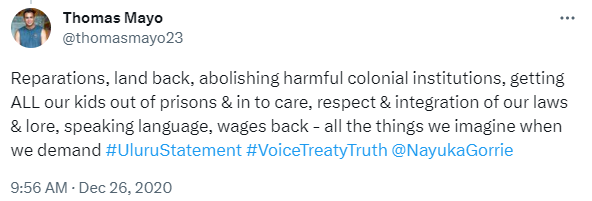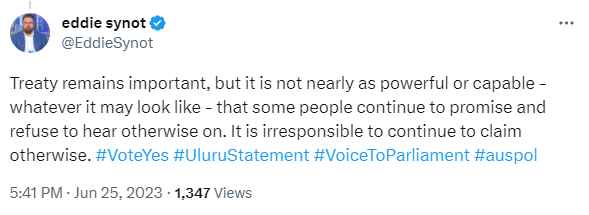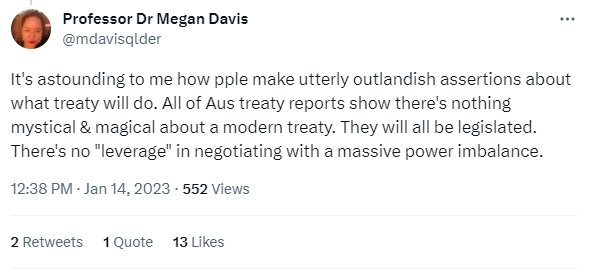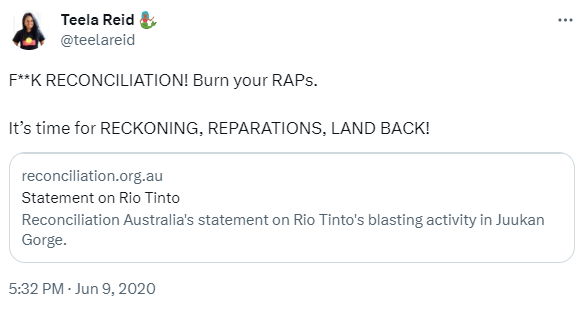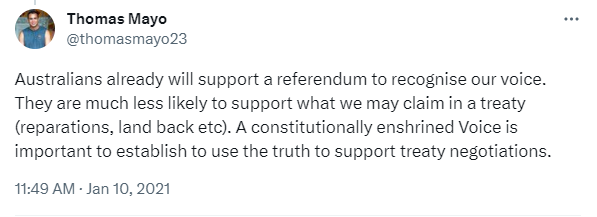How to lose a referendum in 10 easy steps
For future reference: This post relates to the 2023 Aboriginal and Torres Strait Islander Voice Referendum
WARNING: Despite the cringey click-bait title, this post is neither anti-Yes, nor pro-No. It is an examination of various Yes camp strategies & tactics (official or otherwise) and a discussion of their deficiencies. If the bile-filled online echo-chambers of social media have successfully conditioned you to cherry-pick your views as one-line quotes or amusing memes, you will find this analysis both unreadably long, and excruciatingly non-contentious.
Intro
I should be a Yes voter.
There is no great depth to my rationale. Certain fellow Australians are clearly (in my view) disadvantaged, and are (apparently) asking for my help to change that. All I have to do, is vote Yes to the Voice.
I'm wired to respond favorably to an appeal like that. 👍
Which would be all good, if the Yes campaign wasn't making it so damned hard for me. ☹️
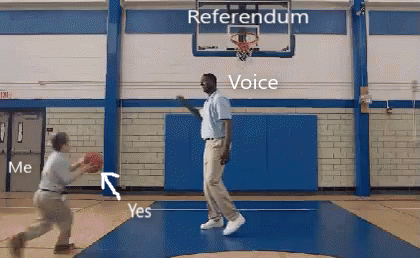
Some background
The Australian Constitution has proved effective at underpinning a prosperous and very livable democracy for well over a century.
That doesn't preclude it being broken in places, and in need of fixing. I'm ok with that, if:
- It actually is broken, and
- It's broken badly enough to warrant fixing, and
- The fix has a good chance of working, and
- The cure isn't worse than the problem.
I want change for disadvantaged indigenous, however I still need to be convinced that the Voice (and Constitutional enshrinement thereof) is the right way of going about it.
Do I think a referendum in favor of the Voice can succeed?
Absolutely. I've yet to meet the person who thinks it is ok for indigenous people to be disempowered by default. If the Voice is the right tool for the job, then I think Australians will embrace it.
Do I think a referendum in favor of the Voice will succeed?
Different question. I have no crystal ball.
Current poll trends ought to give Yes supporters pause for thought. Much water will yet flow under the bridge, and there is still plenty of time for the Yes camp to change minds. Ultimately, there is only one poll that counts.
All I can speak to is my own appreciation of the situation.
My take, and why it's important.
I'm going to own up to being an "average" Australian. Because I think it is (depressingly, boringly, gloriously) true.
If I am as average as I suspect, my views aren't going to stray too far from those of the majority.
Accordingly, if you want to understand how this whole schemozzle registers with average Australians, I am a useful data point.
If I am not an average punter, that doesn't hold - your work here is done. So that your visit was not a complete waste of time, here's a link to a youtube channel I have been viewing lately. The Hoof GP🐮. It's a ripper. Enjoy!
If you have chosen to stick around, the remainder of this post is a list of things that I think the Yes camp should do if they want to lose this referendum. As you will see, I think they are pretty much nailing all of them.
Disclaimer
I remain cautiously open to the Voice. I don't offer the following list to mock or ridicule. Were I an ideological No voter this list would not see the light of day (you don't interrupt opponents while they are making mistakes1).
If the Voice is to succeed, I want it to do so with overwhelming support, based on demonstrable merit and meticulous engineering.
If it is to fail, I want the judgment to be defensible based on an insufficiency of intrinsic worthiness. Not because of political gamesmanship, or power seeking Machiavellianism. Not because of fear and uncertainty. Not because of amateurish mistakes and poor communication.
If I have anything to contribute to this debate, it is as a fascinated commentator with some ability to distill and clarify the various narratives. People will come to their own conclusions; it is my (childishly optimistic?) preference that they do so in a pressure-free, informed/mindful manner.
How to lose a referendum in 10 easy steps
✅1. Don't explain the problem.
I don't need to hear about incarceration rates, education levels, poverty rates, or lifespans.
I accept all these things. They are all bad. They are also not helpful in explaining the problem.
These things are all symptoms. They are effects.
If I don't understand causes, how can I agree with proposed solutions?
Sometimes I hear terms like "structural inequality", "intergenerational poverty", and "systemic racism". I think these get closer to actual causes. But these don't feature in the Yes case, so...?
As I mentioned in my analysis of the USFTH, Voice proponents seem to take for granted that your average Australian understands the causes2 of indigenous disadvantage. We don't.
✅2. Don't explain the solution.
We are continually told the "solution" is listening to indigenous people.
Really? Are indigenous people not listened to? All the past resources directed to indigenous affairs have been allocated without consulting indigenous people? This is not credible. Maybe it has been done poorly (surprise, politicians and the public service are involved), but consultation has occurred.
Does it ring true that indigenous people just want to be listened to? If it were me, I would want not just to be heard. I would want guarantees that my input was going to result in meaningful action. Without this, the whole thing is a bit pointless.
Regardless, the desired outcome of being heard (and not being ignored) says nothing about how it will be achieved.
The "solution" is the machinery that must be implemented to create the desired outcome.
Which brings us nicely to the dreaded "detail" of the Voice.
This pinless grenade continues to be passed around by Yes proponents, apparently in the hopes that someone else will know how to dispose of it.
It's clearly a strategy, just a poor one IMHO. The Voice is going to be created by legislation, the ALP should have a working proposal available already.
Please don't suggest Langton-Calma, or Leeser-Dodson, or USFTH/Referendum Council.
They were my first stop.
They are not without merit, but provide (at best) only two things:
- summaries of discussions amongst a very narrow section of the Australian community, and
- a set of suggestions and ideas for representation and action, as yet untested by serious scrutiny or informed debate.
These reports do not constitute an accepted blueprint for the Voice, and not even the Yes side of the aisle is pretending they do.
What about the argument that "detail doesn't belong in the Constitution"?
Totally fair. Except, is anyone actually arguing that the detail should be in the Constitution? I just want to know whether it is worth having at all.
There is catch-22 chicken and egg feel to this. If we knew what the Voice was, we'd presumably know we needed it in the Constitution. But we can't know what it is, because we haven't yet put it in the Constitution.
I am not someone who worries about a third chamber of parliament. I don't think the Voice is going to be putting calamitous amounts of power in the hands of a minority club of indigenous elites.
I am 100% worried that it will be an unworkable public sector boondoggle, achieving nothing other than to squander taxpayer dollars while binding up national progress in yet more virtue-branded red tape.
Here's the thing. Forget the rest of us. Do even Yes proponents know what the Voice will look like?
Are we confident that the Voice won't end up as a catalyst for yet more indigenous disappointment if it isn't the magic panacea Yes supporters expect?
Quick example: Proponents claim the Voice needs to be in the Constitution so that it is not a political football. And yet the government has free reign to meddle (outside of dissolving it). Budget. Composition. Procedures3. Does this not look exactly like the political football Thomas Mayo says it cannot be? If people are expecting something other than a rebranded version of what already exists, they may be unpleasantly surprised...
Without finding that common ground before a referendum Parliament may find itself with significant Indigenous voices dissatisfied with what is subsequently proposed and yet be in a position that the constitution requires a body to be set up. What was intended to be a unifying and progressive move forward could turn into a lightning rod for discontent. That would be a terrible outcome for everyone.
- Amanda Vanstone, Referendum Council Final Report, 20174
✅3. Tie your fortunes to one political party.
Everyone knows this is a bad strategy. 😬
Particularly the Yes camp.
Voice supporter Professor George Williams has been adamant about expecting a referendum to fail if our major political parties disagree5.
I hear the argument that with modern tech and the ability to go direct to the people, the historical certainty of needing bipartisan support to win a referendum no longer holds. Anything is possible I guess 🙄.
Large swaths of people across this country identify with the Liberals or the Nationals. Acting like these politicians are not tightly coupled with their constituents is a brave call.
"Mr Potato is a racist bad man who represents yesterday's ideas."
Yes. No. Maybe. It's totally irrelevant.
Did nobody see this coming? Was there no strategy to deal with this other than to go straight to insults and political brawling?
I am sure Yes insiders will say they did everything humanly possible to maintain bipartisan support. And who knows, maybe they did. If that is truly the case, then it probably speaks to some profound underlying issues with how the Yes campaign has been formulated.
✅4. Throw mud.
It doesn't work.
Well. That's not totally true. It works well to:
- cement pre-existing positions, and
- cause people to disengage, avoiding the discourse.
Smearing. Shaming. Patronizing. Attacking. The vitriol, and ad-hominin attacks, wear me out.
❝I thought I knew what the word 'racist' meant. If I did, I do no longer. It is so pervasively used, by every possible side of the Voice debate, that I think maybe it now has no meaning at all.❞
- Stu Pocknee, Right here, Right now.
I can't really differentiate between Yes and No supporters when it comes to effort levels in the mud-slinging championship.
However, it is the Yes case that has most to lose. Undecided voters who are turned off by the animus are unlikely to step out of their safe zone. They'll cling to the status quo.
Mud slinging is a large bore footgun.
✅5. Project confused and contradictory messaging.
⬆️ Langton-Calma is the "detail".
⬇️ Langton-Calma isn't the "detail".
⬆️ The Voice is a benign advisory body.
⬇️ The Voice has real teeth.
⬆️ Politicians must respect the Voice.
⬇️ Politicians can ignore the Voice.
⬆️ The Voice will advise parliament.
⬇️ The Voice will advise all government departments.
⬆️ The Voice is only for issues that exclusively affect indigenous peoples.
⬇️ The Voice will address any and all issues.
⬆️ Indigenous people just want to be heard.
⬇️ Indigenous people want real control.
The phrase "make it up on-the-fly" comes to mind.
I don't think Yes proponents intentionally take contradicting positions. It's a predictable result of adopting an ad-hoc plan.
It does not engender confidence.
✅6. Tell me I should vote for change "because indigenous people are asking for it".
If indigenous people make a representation about issues of deep concern to them, there is a clear imperative to listen.
But the mere existence of a request does not equate to automatic assent.
Changing the Constitution is an issue of deep concern to all Australians.
Everyone will get a say. We'll all express an opinion on this issue. And that's the way it should be.
✅7. Tell me "nothing else has worked, so we must do this".
If there have been 99 failed solutions in a row, am I supposed to believe that the 100th is somehow a magical fix just because the previous 99 were lemons? The logic on this one, not strong it is...
✅8. Call me a colonist, a settler, an interloper, etc.
Really? Apparently, my life has been more exciting that I thought. And much longer.
My story (according to Teela): I came here from somewhere (probably England), dispossessed the natives (one way or the other), stole their land, did various other unmentionable things, and am now riding high on the hog with all my crops & livestock 🐏🐄🤠🌽🌾.
The demonstrable falseness of this is laughable. Except not really. Where it gets a bit concerning is when I start to think "Wait, do you actually believe that?" And then "If you do, we inhabit alternate realities. Does your reality also demand some vengeance-fueled Makarrata6-style pay-back?".
These types of accusations don't offend me. They scare me7.
Fear7 is not the emotion the Yes camp needs to be promoting.
✅9. Voice, Treaty, Truth. Pretend this is only about one of them.
The USFTH is pretty clear. Voice, Treaty, Truth.
It is rational to expect that Treaty and Truth will follow closely on the heels of a successful Voice vote.
I have no issue with Truth. Unless it is "Dark Emu" type truth (as that's fantasy).
But I don't understand Treaty.
Voice proponents are all over the spectrum on this. The below tweets are separate (not a continuous thread), and in no particular order.
I really don't know what any of it means. Which makes it a bogeyman. Maybe that's justified. Maybe it's not.
The PM has been doing normal politician things with this issue. That is, being slippery. Take his 2GB interview with Ben Fordham, where he cleverly states the obvious (Voice is not Treaty) while avoiding the actual question.
I know that Voice is not Treaty, so theoretically these should be considered separately on their individual merits. But I'm human. If I don't like Treaty, and think that Voice will aid Treaty in some way, am I really going to want Voice?
Dunno. But I do know that uncertainty doesn't help my Yes vote. Feeling that I am somehow being played doesn't either.
✅10. Make it about the "Vibe".
The USFTH was all about vibe. It was a strategy that worked. I can understand if this is why the Yes camp is sticking to the same formula.
The problem is that the USFTH was custom crafted for a specific purpose. It was about engaging the public and sparking their imagination.
The referendum is a different animal. Here we are getting down to business. At this point airy-fairy hand waving doesn't cut it. Dreams must morph into reality. Details matter.
I have previously quoted Pat Anderson, Co-chair of the Referendum Council, as succinctly stating "You have to inform yourselves. It doesn't matter in the end which way you vote, but do it with some consciousness, with some heart, and with some intellect."
I agree with her. 100%. But for this you need substance, not vibe.
A reliance on a "trust me bro" disclosure model gives me a vibe. Not the Yes kind.
I'm not a conspiracy theorist. I don't eagerly seek hidden agendas. I'm confident "Yes" proponents are acting in good faith, with conviction, and positive motives.
It's not enough. The road to hell is paved with good intentions. A lack of substance feeds into my fear that the Voice is horribly half baked.
✅11.8 Bonus Point! Pretend Recognition and Voice are the same thing.
The forced enmeshing of concepts in the "Recognition in the Constitution through a Voice" narrative is now doing more harm than good.
"Voice" and "Constitutional Recognition" are two separate things. Like, totally. The spin doesn't matter, they are not the same.
It's pretty clear where it all started. Without getting too deep into it, politicians thought they could fob off the feisty natives by throwing out some crumbs in the form of a (fairly meaningless, non-controversial, cheap) amendment recognizing aboriginals as the first peoples of Australia.
Indigenous peoples, not being idiots, saw the scam and wanted no part of it. But the wily folks at the Referendum Council came up with the radical idea of simply redefining/rebranding [their idea of meaningful change, Voice] as recognition. Audacious, and successful9.
The ploy achieved its aim, and should have been left there.
Rather than doing so, the Yes camp has chosen to double down on this (now pointless) piece of non-intuitiveness.
Nothing sets off an Australian voter's spidey-senses like political doublespeak.
❝We're probably Ok with 'Recognition'. It seems harmless.
But while we're being sold on 'Recognition', we're actually getting 'Voice'. WTF?❞
- Bruce, regular Australian voter (with regular penchant for hyperbole), probably.
It is just another way that the Yes camp has found to sow uncertainty and doubt. Sub-optimal ☹️.
EDIT 2023-09-20. See also: The vexing question of 'recognition'.
Finally
You don't get to know how I am voting. It's nunya, and it's irrelevant. I'm nobody's role model.
Anyway, I probably won't make a decision until referendum day.
There isn't an analysis of the No case here, mainly because it doesn't really interest me.
I don't need help voting No. That should be everyone's default position when it comes to changing the Constitution.
I need help voting Yes.
The Yes camp is doing an astoundingly poor job of delivering any.
Were I to vote Yes today, it would be despite the Yes campaign, not because of it.
We will see if anything changes in the coming months.
EDIT 2024-01-03. If you do want to see what my vote actually ended up being see 'A bridge too far'.
🗳️🗳️🗳️
attributed to Napoleon Bonaparte.↩
NB: Causes, not origins, unless somehow the origins do indeed factor into current day causes.↩
George Williams & Chris Merritt - The Voice to Parliament: The Legal Realities↩
https://ulurustatemdev.wpengine.com/wp-content/uploads/2022/01/Referendum_Council_Final_Report_2017.pdf pg65↩
How to Win the Referendum to Recognise Indigenous Peoples in the Australian Constitution INDIGENOUS LAW BULLETIN July / August 2011, ILB Volume 7, Issue 25↩
'Makarrata' used here in the literal sense, as attributed to Merrikiyawuy Ganambarr-Stubbs.↩
To be clear, the foolish tweets of certain "passionate" activists are not really all that scary. Comparisons with other regions of the world (like RSA) are not helpful. But different people react in different ways, and if you give someone a wedge and the incentive to hammer it, what are you expecting?↩↩
I stopped at 11 out of 10. This post is long enough. Already I can think of 12 and 13, but they can wait for another time.↩
I would have loved to have seen the politician's faces when they realized they'd been played 😆. If you haven't already, now would be an excellent time to read Amanda Vanstone's (amazingly prescient) qualifying statement (Footnote #4), and imagine the machinations that were going on in her head when she wrote it 🤯.↩
